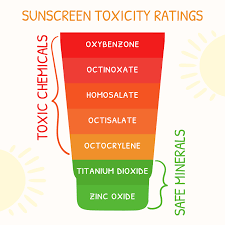
Bad Sunscreen Ingredients You Should Avoid
When it comes to protecting your skin, sunscreen is one of the most important steps in your routine. But not all sunscreens are created equal. Some sunscreen ingredients can harm your skin, disrupt your hormones, or even harm the environment. Knowing what to avoid can make a big difference for your health and the planet.
Harmful Sunscreen Ingredients You Should Avoid
- Oxybenzone
Oxybenzone is a chemical sunscreen ingredient that absorbs UV rays. However, it is known to disrupt hormones and has been linked to allergic reactions. It’s also harmful to marine life and contributes to coral reef bleaching. - Octinoxate
Like oxybenzone, octinoxate is another UV-absorbing chemical. It’s associated with hormone disruption and has been banned in some areas due to its negative effects on coral reefs. - Homosalate
This common sunscreen ingredient can build up in the body over time. It can disrupt hormones and may break down into harmful byproducts when exposed to sunlight. - Parabens
Parabens are preservatives used to extend the shelf life of products. In sunscreen, they may disrupt hormones and have been associated with skin irritation. - Retinyl Palmitate (Vitamin A)
While vitamin A is great in some skincare products, retinyl palmitate in sunscreen can become toxic when exposed to sunlight, potentially increasing the risk of skin damage. - Fragrance
Added fragrance in sunscreen can cause skin irritation, especially for those with sensitive skin. It’s better to choose fragrance-free options. - Alcohol (Denatured Alcohol)
Some sunscreens use alcohol to create a lightweight texture, but it can be drying and irritating to the skin. - Avobenzone
While avobenzone is effective at protecting against UVA rays, it’s unstable when exposed to sunlight unless paired with stabilizers. It can also cause irritation in some individuals.
Better Sunscreen Ingredients to Look For
If you want a sunscreen that’s safer for your skin and the environment, here are some great ingredients to consider:
- Zinc Oxide
A natural mineral that provides broad-spectrum protection. It’s gentle on the skin and safe for sensitive skin types. - Titanium Dioxide
Another mineral-based ingredient, titanium dioxide is effective at protecting against UV rays and is considered reef-safe. - Non-Nano Minerals
Look for sunscreens labeled “non-nano.” This ensures the particles are large enough not to be absorbed into the bloodstream or harm marine life. - Natural Oils (e.g., Sunflower Seed Oil)
Some sunscreens incorporate natural oils to hydrate the skin while providing a physical barrier against UV rays. - Ceramides and Hyaluronic Acid
These ingredients are often added to help keep your skin moisturized while protecting it from the sun.
Recommended Good Sunscreens
Here are some excellent sunscreen options to consider:
- EltaMD UV Clear Broad-Spectrum SPF 46
This lightweight, mineral-based sunscreen is perfect for sensitive and acne-prone skin. It contains zinc oxide and niacinamide for soothing benefits. - Blue Lizard Australian Sunscreen Sensitive SPF 30+
A reef-safe, mineral sunscreen that’s gentle on the skin and provides reliable sun protection. - La Roche-Posay Anthelios Melt-in Milk Sunscreen SPF 60
This sunscreen offers broad-spectrum protection and is formulated with a lightweight, non-greasy texture. - Thinkbaby Safe Sunscreen SPF 50+
A great option for kids and adults, this sunscreen uses non-nano zinc oxide and is free from harmful chemicals. - Badger Broad Spectrum SPF 30 Unscented Sunscreen
Made with organic ingredients and zinc oxide, this sunscreen is reef-safe and suitable for sensitive skin. - Supergoop! Mineral Sheerscreen SPF 30
A sheer, weightless sunscreen that provides mineral-based protection without leaving a white cast.
Frequently Asked Questions about Bad Sunscreen Ingredients You Should Avoid
1. Why should I avoid chemical sunscreens?
Chemical sunscreens often contain ingredients that can irritate the skin, disrupt hormones, or harm marine ecosystems.
2. Are all chemical sunscreens bad?
Not all are harmful, but it’s important to read the label carefully and research any ingredients you’re unsure about.
3. What does “reef-safe” sunscreen mean?
Reef-safe sunscreens don’t contain ingredients like oxybenzone and octinoxate, which harm coral reefs and marine life.
4. Can I use sunscreen every day?
Yes! Daily sunscreen use protects your skin from premature aging, sunburn, and skin cancer.
5. Are mineral sunscreens effective?
Mineral sunscreens are highly effective at providing broad-spectrum protection and are a great choice for sensitive skin.
6. What’s the difference between physical and chemical sunscreens?
Physical sunscreens sit on top of the skin and reflect UV rays, while chemical sunscreens absorb UV rays and convert them into heat.
7. Can sunscreen irritate sensitive skin?
Some sunscreens, especially those with fragrances or alcohol, can irritate sensitive skin. Opt for fragrance-free and mineral-based formulas.
8. How do I know if a sunscreen is safe?
Look for sunscreens that are labeled reef-safe, fragrance-free, and use non-nano zinc oxide or titanium dioxide.
9. Can I use sunscreen on children?
Yes, but choose a sunscreen specifically formulated for kids. Avoid chemical sunscreens and opt for mineral-based ones.
10. What SPF level is best?
SPF 30 or higher is generally recommended. Reapply every two hours for continuous protection.
Conclusion
Choosing the right sunscreen is essential for your skin’s health and the environment. Avoid harmful ingredients like oxybenzone, octinoxate, and parabens, and instead look for safer options such as zinc oxide and titanium dioxide. By making informed choices, you can protect yourself and contribute to a healthier planet.

Leave a Reply